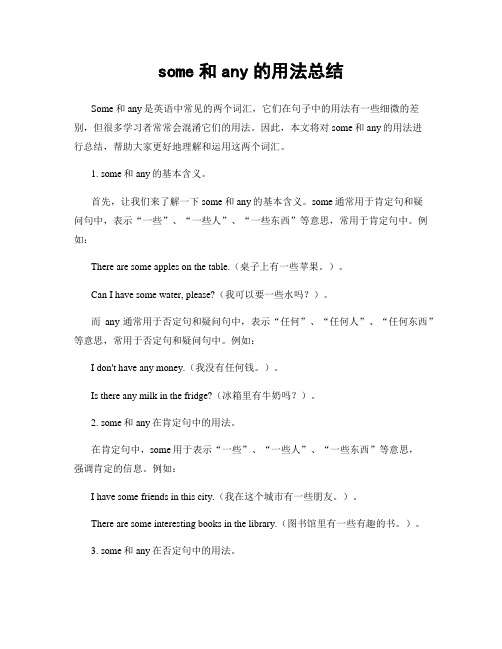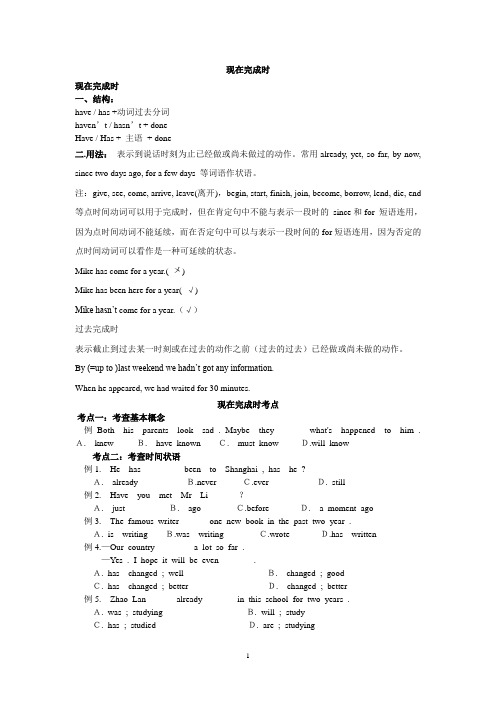英语语法大攻克--介词 some any have has用法
- 格式:doc
- 大小:28.50 KB
- 文档页数:2

some与any的用法总结哎呀,这 some 和 any 的用法啊,可得好好讲讲。
Some 一般用于肯定句中,表示“一些”“几个”。
比如说,There are some books on the table.(桌子上有一些书。
)这里用 some 就很合适,它表明存在一些书。
再比如,I have some friends in this city.(我在这个城市有一些朋友。
)Any 呢,通常用于疑问句和否定句中。
像 Do you have any hobbies?(你有任何爱好吗?)这就是疑问句里用 any。
还有 I don't have any money.(我一点钱也没有。
)这是否定句里用 any。
但这也不是绝对的哦。
在表示请求或建议,希望得到肯定回答的疑问句中,我们也会用 some。
比如说,Would you like some coffee?(你想来点咖啡吗?)虽然是疑问句,但用 some 表示说话人希望对方能喝点咖啡。
给大家举个实际的例子吧,比如你去商店买东西,你可能会问店员,Do you have any apples?(你们有任何苹果吗?)这就是在询问有没有苹果。
如果店员回答,Yes, we have some nice apples.(是的,我们有一些不错的苹果。
)这就是肯定句里用 some 来表示有一些苹果。
再比如,妈妈问孩子,Did you eat any cookies?(你吃了任何饼干吗?)孩子回答,No, I didn't eat any.(不,我没吃任何。
)这就是否定句里用 any。
还有一种情况,就是当说“任何一个”的时候,也会用 any。
比如说Any student can answer this question.(任何一个学生都能回答这个问题。
)另外,在一些固定短语中,也会有 some 和 any 的身影。
像 quite a few 表示“相当多”,用的就是 some 的变形。

some和any的用法总结Some和any是英语中常见的两个词汇,它们在句子中的用法有一些细微的差别,但很多学习者常常会混淆它们的用法。
因此,本文将对some和any的用法进行总结,帮助大家更好地理解和运用这两个词汇。
1. some和any的基本含义。
首先,让我们来了解一下some和any的基本含义。
some通常用于肯定句和疑问句中,表示“一些”、“一些人”、“一些东西”等意思,常用于肯定句中。
例如:There are some apples on the table.(桌子上有一些苹果。
)。
Can I have some water, please?(我可以要一些水吗?)。
而any通常用于否定句和疑问句中,表示“任何”、“任何人”、“任何东西”等意思,常用于否定句和疑问句中。
例如:I don't have any money.(我没有任何钱。
)。
Is there any milk in the fridge?(冰箱里有牛奶吗?)。
2. some和any在肯定句中的用法。
在肯定句中,some用于表示“一些”、“一些人”、“一些东西”等意思,强调肯定的信息。
例如:I have some friends in this city.(我在这个城市有一些朋友。
)。
There are some interesting books in the library.(图书馆里有一些有趣的书。
)。
3. some和any在否定句中的用法。
在否定句中,通常使用any来表示“任何”、“任何人”、“任何东西”等意思。
例如:I don't have any money.(我没有任何钱。
)。
There isn't any coffee left.(没有剩下任何咖啡了。
)。
4. some和any在疑问句中的用法。
在疑问句中,通常使用any来表示“任何”、“任何人”、“任何东西”等意思。
例如:Is there any milk in the fridge?(冰箱里有牛奶吗?)。

不定代词some和any的用法不定代词some和any的用法一、some和any的用法some意为“一些”、“几个”,通常用于肯定句中。
现将其主要用法归纳如下:1)some作形容词用时,可以修饰复数可数名词,也可以修饰不可数名词。
例如:There are some students in the classroom. 教室里有几个学生。
There is some milk in the glass. 杯子里有一些牛奶。
2)some作代词用时,可在句中作主语或宾语。
例如:Some of the boys are playing games now. 有几个男孩现在正在做游戏。
I have no paper. Please give me some. 我没有纸了,请给我一些吧。
3)some有时也可以用在疑问句或条件句中,表示请求、建议,并期望得到对方的肯定回答。
它也可以用于反问句中。
例如:Can you give me some money? 你能给我一些钱吗?Would you like some more rice? 再来点米饭好吗?Why don’t you buy some flowers for her? 你为什么不给她买些花呢?If you want (some), I’ll give you some. 如果你想要(一些),我就给你一些。
any也有“一些”的意思,但它常用在否定句、否定答语或疑问句中。
其具体用法如下:1)any作形容词用时,可以修饰可数名词的单数或复数,也可以修饰不可数名词。
例如:Do you have any questions to ask? 你有什么问题要问吗?There isn’t any water in this bottle. 这个瓶子里没有水。
2)any作代词用时,也可用于肯定句中,表示“任何”的意思,起强调作用。
例如:You may take any of them. 这些东西,你随便拿哪个都行。

关于some和any的用法和区别some和any都是常见词汇,他们有共同点也有很多不一样的地方,你们知道他们饿区别在哪里吗?接下来小编在这里给大家带来some和any的用法和区别,我们一起来看看吧!some和any的用法和区别一、some和any作为形容词或代词,可以用来说明或代替复数名词或不可数名词,表示不定量,意为“一些”,其区别是:对其所说明或代替的名词持肯定态度时,用some;持非肯定(否定或疑问)态度时,用any。
在以下句子中使用some:1.肯定句(包括肯定的陈述句和祈使句以及反意疑问句中肯定的陈述部分)。
如:There are some new books on the teacher's desk.We have a lot of sugar. Take some with you, please.He bought some bread, didn't he?2.持肯定态度的一般疑问句。
如:Are there some stamps in that drawer?Didn't she give you some money?3.表示请求或建议的一般疑问句,通常都希望得到对方肯定的答复,所以也用some。
如:May I ask you some questions?Would you like some tea?4.特殊疑问句及选择疑问句。
因为特殊疑问句和选择疑问句并不对some所说明或代替的名词表示疑问。
如:Where can I get some buttons?Do you have some pens or pencils?在以下句子中使用ANY:1.否定句(包括否定的陈述句和祈使句以及反意疑问句中否定的陈述部分)。
如:I can't give you any help now.Do not make any noise.There weren't any trees here, were there?2.含有除not以外的其他否定词或否定结构的句子。

现在完成时现在完成时一、结构:have / has +动词过去分词haven’t / hasn’t + doneHave / Has + 主语+ done二.用法:表示到说话时刻为止已经做或尚未做过的动作。
常用already, yet, so far, by now, since two days ago, for a few days 等词语作状语。
注:give, see, come, arrive, leave(离开),begin, start, finish, join, become, borrow, lend, die, end 等点时间动词可以用于完成时,但在肯定句中不能与表示一段时的since和for 短语连用,因为点时间动词不能延续,而在否定句中可以与表示一段时间的for短语连用,因为否定的点时间动词可以看作是一种可延续的状态。
Mike has come for a year.( 〤)Mike has been here for a year( √)Mike hasn’t come for a year.(√)过去完成时表示截止到过去某一时刻或在过去的动作之前(过去的过去)已经做或尚未做的动作。
B y (=up to )last weekend we hadn’t got any information.When he appeared, we had waited for 30 minutes.现在完成时考点考点一:考查基本概念例Both his parents look sad . Maybe they ______what's happened to him .A. knew B. have known C. must know D.will know考点二:考查时间状语例1. He has _______ been to Shanghai , has he ?A. already B.never C.ever D. still例2. Have you met Mr Li ______?A. just B. ago C.before D. a moment ago例3. The famous writer _____ one new book in the past two year .A. is writing B.was writing C.wrote D.has written例4.—Our country ______ a lot so far .—Yes . I hope it will be even ______ .A. has changed ; well B. changed ; goodC. has changed ; better D. changed ; better例5. Zhao Lan ______already ______in this school for two years .A. was ; studying B. will ; studyC. has ; studied D. are ; studying例6. We ______ Xiao Li since she was a little girl .A. know B. had known C. have known D. knew例7. Harry Potter is a very nice film .I_______ it twice .A. will see B. have seen C. saw D.see考点三:考查与一般过去时的区别例1. —These farmers have been to the United States .—Really ? When _____ there ?A. will they go B. did they goC. do they go D. have they gone例2.—______ you ___ your homework yet ?—Yes . I _____ it a moment ago .A. Did ; do ; finished B. Have ; done ; finishedC. Have ; done ; have finished D. will ; do ; finish考点四:考查非延续性动词的用法例1. His father ______ the Party since 1978 .A. joined B. has joined C. was in D. has been in例2.—Do you know him well ?—Sure .We _________ friends since ten years ago .A. were B. have been C. have become D. have made例3.—How long have you ____ here ?—About two months .A. been B. gone C. come D. arrived例4. Hurry up! The play __________ for ten minutes .A. has begun B. had begunC. has been on D. began例5. His uncle died two years ago .(改变句子,句意不变)His uncle has _______ _______ for two years例6. Her mother has been a Party member for three years .(同义句)Her mother _______ the Party three years ________ .例7. It _____ ten years since he left the army .A. is B. has C. will D. was简析:现在完成时中,非延续性动词不能与for和since引导的表示一段时间的状语连用,通常是用相应的延续性动词来代替。

英语some和any的用法小结(肯定句、否定句、疑问句)some和any 既可以修饰可数名词又可以修饰不可数名词,some 常用在肯定句中,而any则常用在否定和疑问句中。
因此 some和any 的用法主要是考虑用在肯定句、疑问句还是否定句中,与名词的可数与否无关。
some意为“一些”,可作形容词和代词。
它常修饰可数名词复数。
如:some books一些书,some boys一些男孩,也可修饰不可数名词,如:some water一些水,some tea一些茶叶,some常用在肯定句中。
any意为“任何一些”,它也可修饰可数名词复数或不可数名词,常用于疑问句和否定句。
Some和any的主要用法一 some意为“一些”、“几个”,通常用于肯定句中。
现将其主要用法归纳如下:1)some作形容词用时,可以修饰复数可数名词,也可以修饰不可数名词。
There are somestudents in the classroom. 教室里有几个学生。
There is somemilk in the glass. 杯子里有一些牛奶。
2)some作代词用时,可在句中作主语或宾语。
Some of the boys are playing games now. 有几个男孩现在正在做游戏。
I have no paper. Please give me some. 我没有纸了,请给我一些吧。
二some有时也可以用在,表示请求、建议,并期望得到对方的肯定回答的疑问句中。
Can you give me some advice? 你能给我一些建议吗?(表请求)Would you like some more rice? 再来点米饭好吗? (表建议)。
some和any的用法与区别Some和any是英语中常用的两个词汇,它们在句子中有不同的用法和含义。
在本文中,我们将详细探讨some和any的用法及区别。
首先,我们将介绍对于肯定句、否定句以及疑问句中的使用规则;接下来,我们将探讨some和any作为代词、形容词以及副词时所具备的具体含义;最后,我们将总结some和any的区别及其应用。
一、some和any在肯定句、否定句与疑问句中的使用1. 在肯定句中:Some用于表示肯定且不确定数量或程度的情况。
例如,“I have some apples”(我有一些苹果);Any也可用于概括性肯定陈述,但通常较少使用。
当表示请求或提供时,any 也可以用在肯定句中。
例如,“Can I have any cookies?”(我可以吃一些饼干吗?)2. 在否定句中:Some 在否定句中转化为 any。
例如,在“no apples”(没有苹果)——改为——“not any apples”(没有任何苹果);Any在否定陈述中仍然使用。
例如,“I don't have any money”(我没有任何零钱)。
3. 在疑问句中:Some用于请求或提供,当请求或提供被认为有可能肯定时。
例如,“Can you give me some water?”(你能给我一些水吗?);Any用于一般性的疑问句中,表示没有偏向性。
例如,“Do you have any questions?”(你有任何问题吗?)二、some和any作为代词的用法与含义1. 作为代词时,some用来指代确定数量或程度的事物,并且强调其中的一部分。
例如,“There are some books on the shelf”(书架上有几本书);2. any作为代词表示任意数量或无限制的事物。
例如,“Do you have any pens?”(你有任何钢笔吗?)三、some和any作为形容词的用法与含义1. 作为形容词时,some 表示某个特定的人/事物(不是全部),并且通常前面需要使用可数名词复数形式。
some和a ny的用法1、some, any,表示一些, some用于肯定陈述及委婉请求,any用于否定句及一般疑问句。
例: I have some books.Wouldyou like some coffee?I don't have any books.Is thereany coffee in your cup?2、some和a ny 既可以修饰可数名词又可以修饰不可数名词。
some常用在肯定句中,而any则常用在否定和疑问句中。
因此some和a ny 的用法主要是考虑用在肯定句、疑问句还是否定句中,与名词的可数与否无关。
3、some意为“一些”,可作形容词和代词。
它常修饰可数名词复数。
如:some books一些书,some boys一些男孩,也可修饰不可数名词,如:some water一些水,some tea一些茶叶,some常用在肯定句中。
any意为“任何一些”,它也可修饰可数名词复数或不可数名词,常用于疑问句和否定句。
如:--I have some tea here. 我这儿有些茶叶。
--Ican’tseeanytea.我没看见茶叶。
--Do you have any friend s at school? 你在学校有些朋友吗?--I have some Englis h books, they are my best friend s. 我有英语书,它们是我最好的朋友。
4、但在表示建议,反问,请求的疑问句中,或期望得到肯定回答时,多用some而不用an y。
如:Wouldyou like some coffee? 你要不要来点咖啡?What aboutsome fruitjuice?来点水果汁如何?5、当any表示“任何”的意义,起强调作用时,它可以用在肯定句中;Any studen t can answer this questi on.任何学生都可以回答这个问题。
some和any的用法小结我们知道,some通常用于肯定句,any则用于否定句或疑问句。
但随着学习的深入,我们发现,情况并不完全如此,上述说法只能算是对some和any用法的一个不太准确和完整的概括。
由于some和any是英语中比较常用的词,我们有必要对其用法作出较完善的归纳。
一、some和any作为形容词或代词,可以用来说明或代替复数名词或不可数名词,表示不定量,意为“一些”,其区别是:对其所说明或代替的名词持肯定态度时,用some;持非肯定(否定或疑问)态度时,用any。
在以下句子中使用some:1.肯定句(包括肯定的陈述句和祈使句以及反意疑问句中肯定的陈述部分)。
如:There are some new books on the teacher's desk.We have a lot of sugar. Take some with you, please.He bought some bread, didn't he2.持肯定态度的一般疑问句。
如:Are there some stamps in that drawerDidn't she give you some money3.表示请求或建议的一般疑问句,通常都希望得到对方肯定的答复,所以也用some。
如:May I ask you some questionsWould you like some tea4.特殊疑问句及选择疑问句。
因为特殊疑问句和选择疑问句并不对some所说明或代替的名词表示疑问。
如:Where can I get some buttonsDo you have some pens or pencils在以下句子中使用ANY:1.否定句(包括否定的陈述句和祈使句以及反意疑问句中否定的陈述部分)。
如:I can't give you any help now.Do not make any noise.There weren't any trees here, were there2.含有除not以外的其他否定词或否定结构的句子。
语法训练四:介词、some与any、have与has一、介词复习(表示方位词的基本知识)in:“在……里面”;in the bedroom;in the house;on:“在……上面”;on the table,on the wallunder:“在……之下”;under the bed,under the treein front of :“在……前面”;in front of the housebeside:“在……旁边”;beside the deskbehind:“在……后面”;behind the dooragainst:“依靠”;against the wall,against the door练习:介词in/on/under/beside填空。
(1)Let’s watch TV the living room.(2)Sit the sofa.(3)The cookies are the table the kitchen.(4)The glasses are the cupboard.(5)The cookies are the fridge.(6)The computer is the study.(7)Put the chairs the desks,please.(8)The board rubber is (在……后面)the exercise books.(9)The tape recorder is that corner.(10)Put the tape recorder the shelf.二、some和any1)some“几个,一些”;可修饰可数名词和不可数名词,主要用于肯定句。
例:There are some books on the table. (肯定句,book是可数名词) There is some milk in the bottle. (肯定句,milk是不可数名词)2)any“几个,一些”;可修饰可数名词和不可数名词,但any常用于否定句和疑问句。
语法训练四:介词、some与any、have与has
一、介词复习(表示方位词的基本知识)
in:“在……里面”;in the bedroom;in the house;
on:“在……上面”;on the table,on the wall
under:“在……之下”;under the bed,under the tree
in front of :“在……前面”;in front of the house
beside:“在……旁边”;beside the desk
behind:“在……后面”;behind the door
against:“依靠”;against the wall,against the door
练习:
介词in/on/under/beside填空。
(1)Let’s watch TV the living room.
(2)Sit the sofa.
(3)The cookies are the table the kitchen.
(4)The glasses are the cupboard.
(5)The cookies are the fridge.
(6)The computer is the study.
(7)Put the chairs the desks,please.
(8)The board rubber is (在……后面)the exercise books.
(9)The tape recorder is that corner.
(10)Put the tape recorder the shelf.
二、some和any
1)some“几个,一些”;可修饰可数名词和不可数名词,主要用于肯定句。
例:There are some books on the table. (肯定句,book是可数名词) There is some milk in the bottle. (肯定句,milk是不可数名词)
2)any“几个,一些”;可修饰可数名词和不可数名词,但any常用于否定句和疑问句。
例:Are there any chairs in the room?(疑问句)
There isn’t any tea in the cup.(否定句)
练习:用some/any填空。
(1)I have books.
(2)They don’t have cats.
(3)Do you have exercise books?
(4)There are desks in the classroom.
(5)Do the boys have bikes?
三、have和has复习
主语跟动词“有”(have/has)要保持一致,
(1)第一人称(单数、复数,如I,we)用have;如:I have a cat.
(2)第二人称(如you)用have;如:You have two dogs.
(3)第三人称单数(如he,she,it )用has;如:It has a big nose.
(4)第三人称复数(如they)用have;如:They have long tails.
此外,1)下列词组作主语应视为第三人称单数,如:Mr Chen,Becky,
my uncle,the woman……
如:Uncle Tim has a farm.
2)下面的词组作主语应视为第三人称复数,如:Jiamin and Lily,
My friends,the boys……
如:My friends have many books.
练习:用适当的单词填空。
(1)Jiamin (is,are) a boy.He (have,has)a pet.
(2)Sally and Janet (have,has)two new pencil-case.
(3)Do you (have,has)a red bag?。